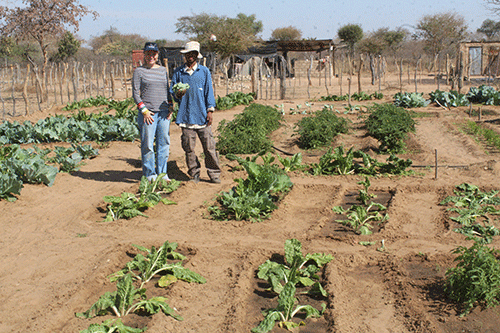TSUMKWE – Goasoma lies some 45 kilometres outside Tsumkwe. The village boasts a flourishing garden that feeds the 60 San households who, before the initiative in 2017, relied largely on the unstable supply of wild berries and other field food.
“I did not know how to prepare vegetables as I did not eat them before in my life. I am used to wild food. But nowadays I do not skip many days without cooking spinach,” said //Oma N!aici, an elderly !Xuu man, who runs the garden.
On the day in late July when New Era visited, N!aici was sad as four elephants stormed his garden early in the morning. However, not much was eaten or destroyed from the garden.
The 1 600 square metres produce kale, cabbage, spinach, tomatoes, carrots, onions and chilli twice a week for the village.
According to N!aici, he decided to establish the garden right after they received training in 2017 through a climate change adaptation programme amongst the San of Nyae Nyae and Na #Jaqna conservancies through funding from the European Union (EU).
The project aimed to adapt land use to reduce the vulnerability of San communities in Nyae Nyae and Na# Jaqna conservancies to the impacts of climate change. This means re-assessing, and where necessary changing the land use, to prevent overgrazing while supporting the local communities in adapting their livelihoods to ensure their survival.
N!aici proved beyond doubt that his community too can integrate into growing vegetables instead of just surviving from wild fruits that they are competing for with wild animals.
“I use to struggle with food. My life was to wake up early in the morning to go hunt for a steenbok or kudu or any other huntable animal to eat. If that day I did not succeed in getting meat, I was forced to collect wild berries, baobab fruit and wild potatoes to feed myself and my family,” he explained.
But now I can enjoy a nice meal. I even prefer spinach soup. I love it so much and everyone here enjoys it too. I am happy that my villagers have also started with backyard gardening to add to what I distribute to their homes. Spinach grows fast and sometimes when it is too much I take it to the conservancy.
Another villager, N!onghoo Glaqo said the vegetables supplied by his neighbour N!aici inspired him to also start his backyard garden, which is also flourishing and feeding his entire family. “I did not know what spinach, tomatoes, onions and cabbage were. Even if I find it there I will not attempt to take it. I didn’t know how to prepare it. But now when I see an elephant close to my garden, I cry. I am so grateful that this organisation came forth to help us this way,” he said.
Glaqo who was also a consistent hunter said he hardly goes to the field to hunt anymore, as he fears that something will happen to his garden. “My wife is a gatherer. She goes into the field to collect field food while I take care of the garden by watering and making it grow. I like being around it. Watching my plants grow every day put a smile on my face,” he explained while walking around in his garden. A group of 10 Ju//hoansi in Makuri village also ventured into gardening part-time while they stick to gathering wild food.
“We are trained to do gardening and preparing a healthy meal. But we still have to go back to the field to collect food to supplement what we are getting from the garden, our husbands who are hunters and the milk from cattle,” said Ju Unoas, one of the gardeners.
Unlike other villages, Makuri has a lot of livestock, which the villagers inherited from their parents.
The programme manager for good governance, civil society, human rights and parliamentary support of the EU in Namibia, Silke Hofs said the flourishing gardens are in fact one result of a previous EU-funded grant project with the Nyae Nyae Development Foundation that was implemented between 2016-2018.
“All villages received similar training and support which focused on securing the garden, mulching and fertilising, basic pest control and crop rotation as well as seed propagation to encourage sustainability. As we can see today, the garden is still up and running, contributing to the community’s food diversity and security. It is encouraging to see that the support that was provided has been incorporated by the communities and that we can witness strong sustainability today,” she said.
ljason@nepc.com.na


